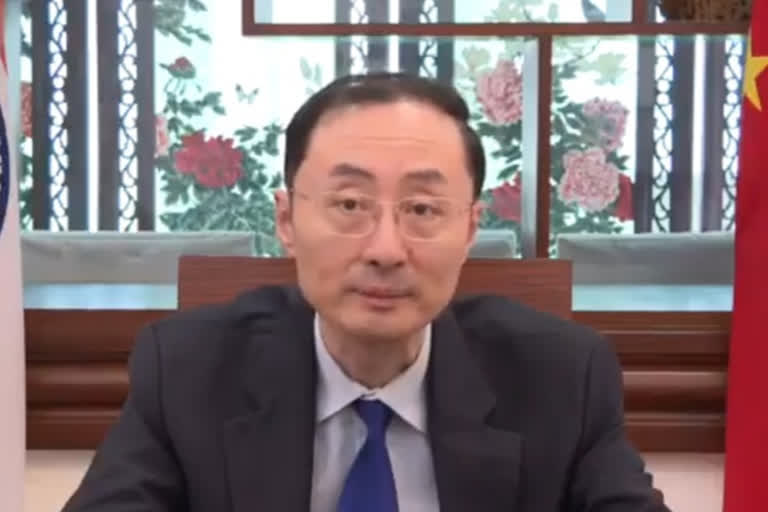New Delhi: Chinese envoy to India Sun Weidong was today asked a pointed question on the number of Chinese casualties in the Galwan Valley midnight clash of June 15 which left 20 Indian soldiers dead. He was addressing a webinar organised by the Institute For Chinese Studies (ICS) in Delhi. However, Sun chose to remain mum about the number of PLA soldiers killed which has not yet been officially confirmed by Beijing.
He chose to blame Indian soldiers once again for the violence at the Line of Actual Control (LAC).
“The right and wrong of the Galwan Valley incident are very clear. The responsibility is not on the Chinese side,” said the Ambassador who claimed that China is committed to peaceful development and is not a strategic threat to India.
“With joint efforts on both sides border troops have disengaged on most points. The situation on the ground has de-escalated and tempers are coming down,” he earlier added.
The envoy also dismissed allegations that Chinese claims on Galwan are new and unjustified.
“On the northern bank of Pangong Lake, China's traditional customary boundary line is in accordance with the LAC. There is no such [thing] as China expanded its territorial claim', he said.
Asked about China’s hesitation in exchange of maps and clarification of the LAC since 2002, the envoy said.
“If one side unilaterally delimits the LAC as per its own understanding during negotiations, that could create new disputes, would be a departure from the original purpose of clarification of the LAC.”
The Indo-China border tension was a subject of discussion today when Australian High Commissioner Barry O’ Farrell called on External Affairs Minister Dr S Jaishankar for a one on one meeting. Urging restraint along the LAC, the Australian envoy extended his country’s support for ‘continued moves towards de-escalation’ “As I told the External Affairs Minister of India today, Australia opposes any attempts to unilaterally alter the status quo, which only serve to increase tension and the risk of instability.
It is important that the bilaterally-agreed principles and norms that have helped prevent escalation or miscalculation in the border areas over many decades continue to be observed,” said the Australian envoy in a media statement.
The statement added that “Australia remains deeply concerned by actions in the South China Sea that are destabilising and could provoke escalation.”
However in the ICS interaction today Sun Weidong spoke at length to claim that the ‘expansionist label’ could not be pinned on China and said India was changing stance on ‘internal affairs’ of Beijing to create pressure.
“Taiwan, HongKong, Xinjiang, and Xizang affairs are totally China's internal affairs and bear on China's sovereignty and security. While China doesn't interfere in other country's internal affairs, it allows no external interference and never trades its core interests either,” cautioned the Chinese diplomat who has earlier also served in Pakistan.
Also Read: Exclusive: Chinese claims on Galwan not new, says MIT Professor Fravel
Meanwhile at a Brookings seminar, US top official in the Trump administration Lisa Curtis underlined that the LAC standoff has changed the IndoChina dynamics with Asian term impact. “With regard to south Asian countries approaches to China and how those have evolved I would just look at what has happened over the last few months between India and China with their border dispute. Thankfully we are beginning to see disengagement of their forces after a few very tense weeks. This is a good thing. We hope this continues. But I think that the pressure that China put on India on the LAC will have long term impact on how India views the relationship. It will change the dynamics between the two,” said Curtis, Director of the US National Security Council.
“India demonstrated that it has the will and capabilities to stand up to China. Of course, it played the economic card by banning Chinese apps and putting uphold on Chinese investment economic contracts. And I think the rest of the Indo-Pacific region is watching this very carefully. But I think they would be encouraged by India’s resolve,” she added.
In response to a question on the impact of Indo-China disputes in the South Asian region, Curtlong-held“Years ago it was clear that their long-held border disputes would not be easily resolved. And that each country’s rise would be uncomfortable for the other. Certainly have seen Chinese influence grow with India’s neighbours. Namely Nepal and Srilanka. China not only wields economic clout in these countries but also is getting more involved in their internal politics.,” “Bangladesh has shown a little bit more resilience and really seeks to balance its foreign relations and then, of course, China and Pakistan have evolved really from having a very close security partnership to one that is based increasingly on growing Pakistani dependency through Loans and CPEC (China Pak Economic Corridor),” Curtis further remarked.



